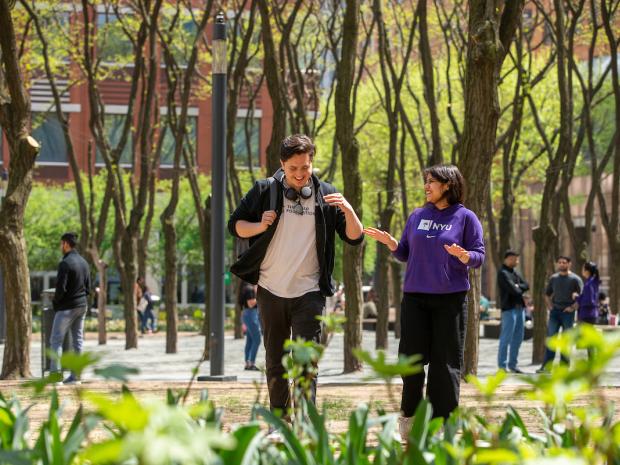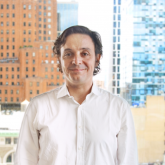- Academics
International Summer School: Urban Data Science

Over three weeks, immerse yourself in cutting-edge disciplines that explore the power of data science to enhance the quality of urban life and create more sustainable, resilient, and equitable global cities. Join us in unraveling the boundless possibilities of data and shaping the future of our urban landscapes.
Organized by NYU Tandon School of Engineering's Center for Urban Science and Progress along with the National and Kapodistrian University of Athens, the Technological University of Uruguay, the University of Lisbon, and the University of Tuscia, the International Summer School aims to bring together students from around the world to collaborate in-person at NYU Tandon, and contribute to a global dialogue about the role of data in urban governance.
Students will be trained in Time Series Analysis, Complex Systems, Data Science, Machine Learning, and Satellite Image Analysis in relation to urban topics. Each weekday throughout this non-credit-bearing program will include a full day of course material. Mornings will be dedicated to lectures and training, while afternoons will be spent working hands-on with real data sets to apply teachings.
Curriculum
Week 1: Urban Hydrology
Students will explore rainfall models and simulations, focusing on urban hydrology and extreme events. The curriculum covers hydrological time series characterization, rainfall phenomena observations, and the application of various models at different time scales, including linear parametric models and disaggregation multiplicative cascade methods. Emphasis is placed on the definition of extreme events, utilizing common instrumentation and innovative techniques for rainfall observations. The course introduces statistical notions and provides hands-on experience with R code for monthly scale rainfall simulation using linear parametric models. Students will also understand the importance of sub-hourly rainfall simulation, highlighting the necessity for a robust and user-friendly approach, incorporating COSMOS and the multifractal disaggregation method. Overall, the module equips students with a comprehensive understanding of urban hydrology and practical skills in rainfall modeling.
Week 2: Urban Metabolism
Sustainable urban metabolism refers to the efficient and balanced management of resources, energy, and waste, within urban environments to promote long-term ecological viability, social well-being, and economic prosperity. It involves understanding, analyzing, and optimizing the flows of materials and energy in cities to minimize negative environmental impacts and enhance resilience.
This workshop will enable students to understand the intricate dynamics of urban metabolism, providing valuable insights into resource flows pathways through the economy, its environmental impacts, and sustainable development strategies essential for fostering resilient and thriving cities.
Starting from the application of urban metabolism concepts to nations, followed by a narrowing down to cities, two types of spatial resolutions will be considered (aggregate versus neighborhood scale) to evaluate alternative strategies towards climate neutral cities.
Week 3: Urban Thermal Environment
Urban areas exhibit higher temperatures than the surrounding areas because of their positive thermal balance. Global climate change is synergistically affecting urban temperatures, increasing the magnitude of overheating. About 13,000 cities are exhibiting overheating problems, measured as up to 10.0 °C, and more than 1.7 billion people are living under severe overheating conditions.
Projections about future urban climatic conditions have shown that minimum and maximum temperatures in urban areas may increase substantially due to changes in urban form, urban functions and urban fabric on the one hand and climate change impacts on the other (for instance, heat waves are expected to increase in frequency, duration and intensity).
Urban overheating increases air pollution (ground ozone concentration) as well as the cooling energy consumption of buildings and the peak electricity demand, resulting also in higher emissions of greenhouse gasses; on the other hand it decreases human productivity and leads to surges in heat-related mortality and morbidity while also intensifying mental health problems.
This module will enable students to understand the main mechanisms that control the urban thermal environment, to understand how urban form, urban functions and urban fabric influence urban heat, to realize the synergistic impact of climate change to the state of the urban thermal environment, to assess urban heat at varying temporal and spatial scales, to produce composite urban heat related indicators (for instance the urban heat risk) and to learn and explore urban heat mitigation measures. Ground and satellite data will be used, whereas machine learning will be exploited in view of big data analysis.
Dates & Location
The program will run from June 16th - July 6th at NYU Tandon School of Engineering, located in Downtown Brooklyn, NY.
Eligibility
Applicants must be currently pursuing a graduate degree at NYU Tandon School of Engineering, the National and Kapodistrian University of Athens, the Technological University of Uruguay, the University of Lisbon, or the University of Tuscia.
Accommodations
On-campus housing at NYU will be provided from June 16th - July 6th for students coming from the National and Kapodistrian University of Athens, the Technological University of Uruguay, the University of Lisbon, and the University of Tuscia at no extra cost. Students will reside in University Hall located in Manhattan throughout their stay, which includes access to kitchens. University Hall is approximately a 20-minute train ride away from 370 Jay Street in Brooklyn, which is where the majority of programming will take place.
Students coming from these schools are required to make their own travel arrangements and cover their own travel expenses. Students must be on campus by June 16, 2024.
Faculty
The International Summer School curriculum will be taught by leading faculty members from each of the participating schools, including:
- Maurizio Porfiri, Institute Professor of Mechanical and Aerospace Engineering and Biomedical Engineering; Director of the Center for Urban Science and Progress, New York University Tandon School of Engineering
- Constantinos Cartalis, Professor of Environmental and Climate Physics at National and Kapodistrian University of Athens; Member, European Scientific Advisory Board on Climate Change
- Juan Marrero, Director, Center for Digital Transformation, Technological University of Uruguay
- Paulo Ferrão, Distinguished Professor of Instituto Superior Técnico, University of Lisbon; Member, Mission Board on Climate Neutral and Smart Cities; President, IN+ Center for Innovation, Technology and Policy Research
- Patricia Baptista, Assistant Professor of Instituto Superior Técnico, University of Lisbon; Senior Researcher, IN+ Center for Innovation, Technology and Policy Research
- Salvatore Grimaldi, Professor of Hydrology, University of Tuscia; President, European Cooperation in Science and Technology (COST)
How to Apply
Eligible students may apply by filling out this form. The deadline to apply is February 15, 2024. Accepted students will be notified within 2-4 weeks.
Program Cost
There is no cost to participate in the International Summer School. Lunch will be provided to all participating students (both international and NYU-based) Monday-Friday. Students should be prepared to cover their own travel, meals, and other discretionary costs while living in Brooklyn.


